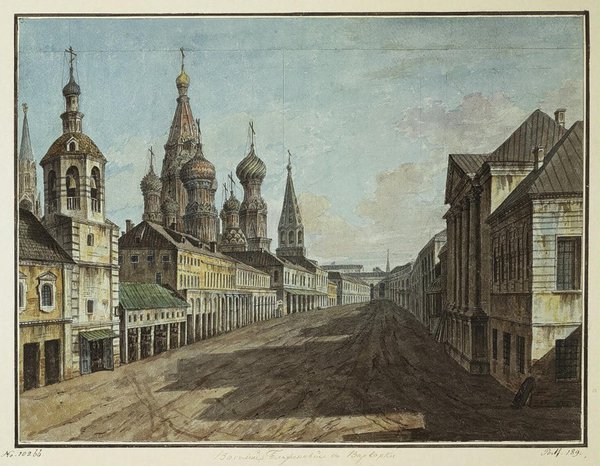Orthodox Christianity: Strong Pillar in Modern Russia
Karl Marx, in his famous seminal treatise, Das Kapital, laid down a basic tenet for revolutionizing and thus usurping control of the world's economic order when he wrote, "Religion is the opiate of the masses". He as well as others of the same persuasion really believed that too.

Karl Marx, in his famous seminal treatise, Das Kapital, laid down a basic tenet for revolutionizing and thus usurping control of the world's economic order when he wrote, "Religion is the opiate of the masses". He as well as others of the same persuasion really believed that too. There was a problem with their thinking though: religion in its many forms had been around since time immemorial; especially Christianity. In order for the proponents of the Marxist ideology to realize their world domination plans, they had to 'market' their replacement 'theology': the statist central planning model. By extension that meant expunging man's spiritual connections anywhere they found it. Moreover, the Marxists resorted to any means possible. Many times they used violent revolutions to achieve their goals; just like they do today; but under a different colored banner.
Church first and foremost on the list
Nowhere did the statists exceed their wildest expectations than what was achieved in Mother Russia. After the October Revolution in 1917, the Bolsheviks 'quietly' went about their business in dismantling the societal institutions of the toppled Czarist Imperial regime. The Church was first and foremost on the Reds' demolition order list. It had to disappear. The tested and proven method of 'purging' the leadership got the wrecking ball moving. With the Romanov Royals since deposed and disposed of, the Kommissars unleashed their propaganda machine across the hinterland. Finding recruits to carry out the purges posed no problem. Loyal kommunists sprouted up like weeds in every village. The latecomers to the Peoples' Party had real motivation: rapid promotion in the Kommunist ranks.
For them to demolish a church was like falling off a log after imbibing much vodka. Arresting the leaders proved easier. Without divine sanctuary the priests had nowhere to hide; they had nowhere to go; their mitigation pleas were viewed as treasonous. After the testimony of one or two state 'witnesses' the clergy had no credible recourse to form a legal defense either. The Kommunists had a ready solution for the clergy's disbelief. A quick train ride to Siberia was all that was needed to solve the impasse. A trial was not necessary. After some hands-on labor in the salt mines the state sanctioned gulags would take care of the rest: re-education for those found worthy of internment and possible release, pending appeal; but only by the state.
The Church survived
For the greater part of the 20th century the Marxist Kommunists laid waste to Christianity. From Moscow to Vladivostok and any place else in between Christian artifacts, relics and monuments were erased from the landscape. What remnant was left of the Orthodox Church could only be found 'underground'. Those parishioners seeking solace in their faith risked both limb and life while venturing to the hidden recesses of the cities in order to find a house of worship. Yet despite those grave dangers the Orthodox Church continued to survive; some historians say they even thrived given the odds of further crackdowns by the Central Planning authority. State hostility towards believers existed right up to the present age. In 1989 after the fall of the Berlin Wall, persecution of the Church began to wane; some say the Kommunist state's softening began well before that momentous event.
There was much evidence for the historians' optimistic assessment. Russian President Vladimir Putin, in recalling his youth while his family lived in St. Petersburg, praised his mother's commitment to attending Orthodox masses as being a major influence later in his adult life. He went on to say that his reverence for the significance of the Orthodox Church in Russian society grew even while he was employed by the very state that disavowed religion's existence.
Churches were opened
After the millennium, as Boris Yeltsin's successor, President Putin moved quickly to restore Christian Orthodoxy's former prominence. Churches were opened. New ones sprang up in increasing numbers. Not only was Christianity on the rise. Judaism too enjoyed resurgence. Moscow boasts of a boon in synagogue constructions. The Jewish community there praises President Putin; they credit his efforts for their improved fortunes. Elsewhere, Putin made it a cornerstone of his government to promote and protect freedom of all religion all across the great expanse.
When the liberal West decried President Putin's acquiescence in the court's decision to try and imprison the miscreants of 'Pussy Riot' for their public desecration of a famous Moscow Orthodox cathedral, the leftists should first look in the mirror. The word irony should appear. Their hypocrisy is exposed. The West's putrid LGBT agenda was at the fore in their support of the Pussy Riot criminal gang. Christian Russia tolerates all religions; even if one chooses disbelief; but not to extent of terrorizing those who profess the Orthodox faith. Good on the Church. Good on President Putin too.
Montresor
Subscribe to Pravda.Ru Telegram channel, Facebook, RSS!


